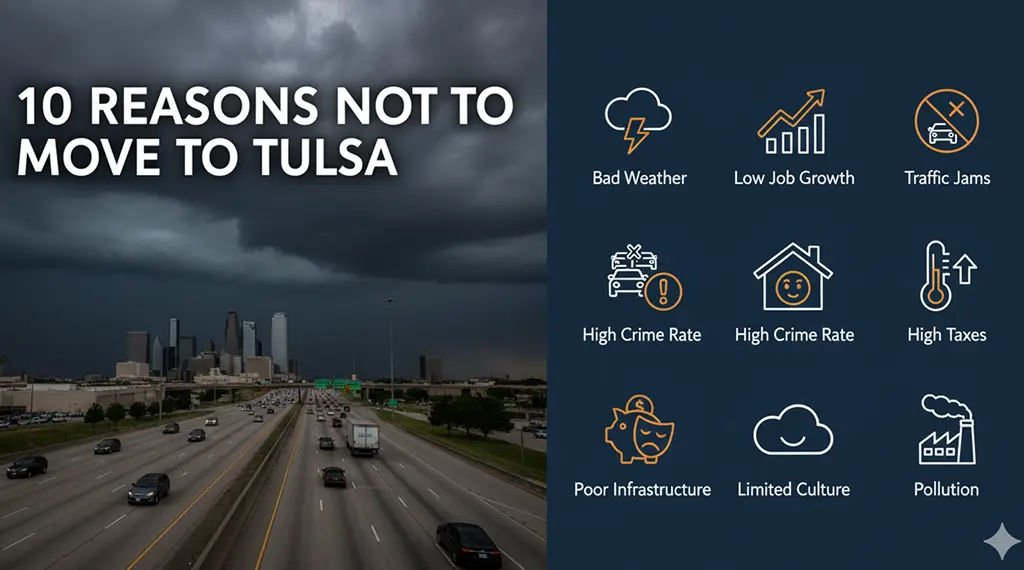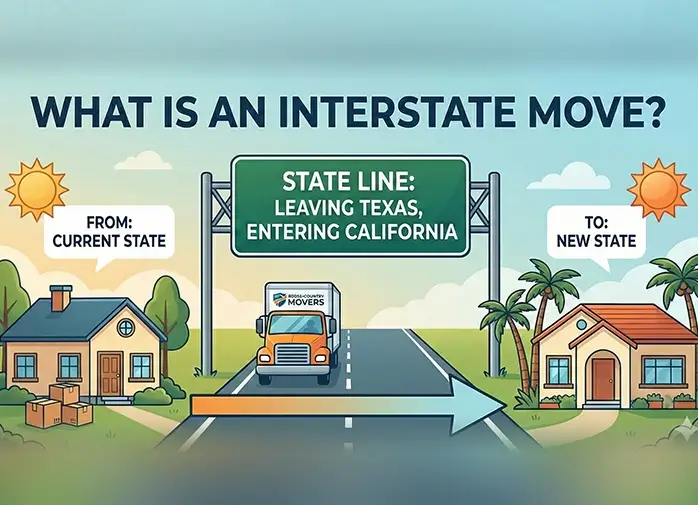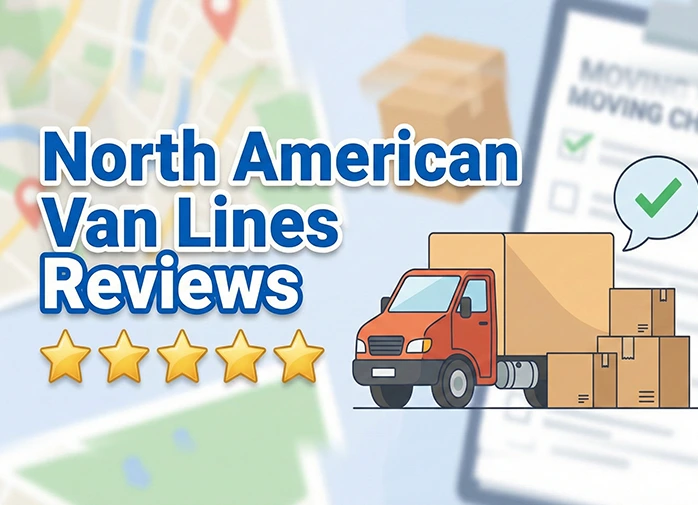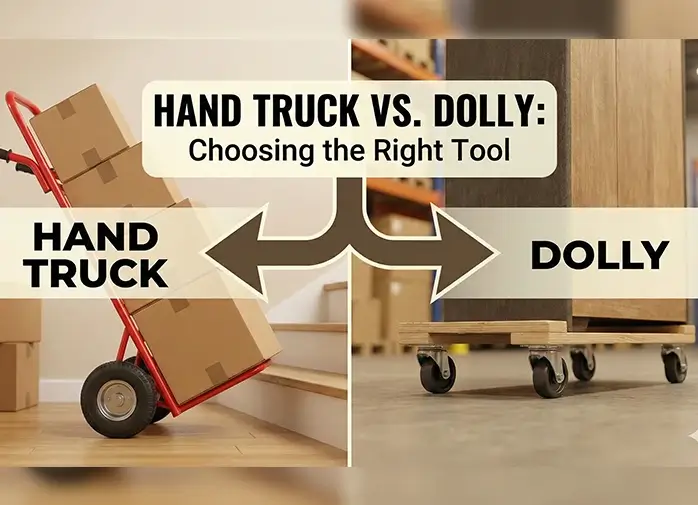
Over the last few years, Tulsa, Oklahoma has been making national headlines, largely due to its Tulsa Remote program—an initiative that offers remote workers cash incentives to relocate. Combine that with the city’s relatively low cost of living, and it’s easy to see why many Americans have considered Tulsa as their next big move.
But beneath the surface of these incentives lies a more complicated story. Like every city, Tulsa has its strengths and weaknesses, but for some people, the drawbacks may outweigh the benefits. From harsh weather and high crime rates to limited career opportunities and cultural gaps, Tulsa presents real challenges that deserve careful consideration before you commit to relocating.
If you’re still set on moving—whether to Tulsa or elsewhere—partnering with a trusted mover like VanLinesMove, which specializes in long-distance and local relocations, can at least make the physical move less stressful. Their expertise can help you focus on evaluating lifestyle factors while they handle the logistics.
In this comprehensive guide, we’ll break down the 10 biggest reasons not to move to Tulsa—so you can make an informed decision about whether this city is truly the right fit for you.
Top 10 Reasons Not to Move to Tulsa
1. Extreme Weather Conditions: Tornado Alley and Sweltering Summers
Tulsa’s location in the heart of Tornado Alley makes severe weather an unavoidable reality. Every spring, the city experiences volatile storms that often include hail, flooding, high winds, and tornado warnings. For newcomers, especially those from states with mild climates, the constant storm sirens can be intimidating.
Summers in Tulsa are also notoriously intense. Temperatures frequently climb above 100°F, accompanied by high humidity that makes outdoor activities uncomfortable. Winters, while not as harsh as northern states, still bring occasional ice storms that shut down roads and utilities.
This unpredictability not only affects your comfort but also your wallet. Homeowners often face higher insurance premiums due to the risk of storm damage. Power outages during both summer and winter storms are common, forcing residents to invest in backup systems or generators.
For people who prefer mild, predictable weather, Tulsa’s climate can feel like a nonstop battle with the elements.
2. Limited Public Transportation: A Car-Centric City
Tulsa isn’t designed for people who don’t drive. Its public transportation system is limited to a modest bus network, which lacks the convenience and coverage found in major metros. There are no subways, trams, or commuter rail systems.
If you move to Tulsa, chances are high that you’ll need to own at least one vehicle per household. Between car payments, insurance, maintenance, and rising gas prices, these costs add up quickly—undercutting the affordability Tulsa often promotes.
For students, seniors, or environmentally conscious residents hoping to live car-free, Tulsa can be frustrating. The city’s sprawling layout and lack of reliable transit make commuting without a car nearly impossible. If you’re coming from cities like New York, Chicago, or Portland, this shift can feel like a major step backward.
3. A Narrow Job Market: Fewer Opportunities for Career Growth
Tulsa’s economy historically revolves around oil, gas, and aerospace. While these industries still provide jobs, the city lacks the economic diversity of hubs like Austin or Denver. Tech, finance, creative industries, and startups—sectors that drive innovation and upward mobility in other cities—are less prevalent in Tulsa.
Remote workers who rely on national employers may not be impacted, but if your job requires in-person work or you’re considering long-term career growth, Tulsa’s limited job market can be a significant obstacle.
Even those in Tulsa Remote often struggle with career development once the incentive period ends. Networking opportunities are scarce compared to larger urban centers, and specialized industries are often underrepresented.
This lack of diverse career options makes Tulsa better suited for retirees or those with stable remote jobs—not ambitious professionals seeking rapid growth.
4. Healthcare Limitations: Access and Specialization Concerns
While Tulsa does have hospitals and medical centers, the healthcare system doesn’t rank as highly compared to larger metropolitan areas. Specialized medical treatments often require trips to Oklahoma City or even out-of-state facilities.
For families with ongoing medical needs—such as children with chronic conditions or older adults requiring specialized care—this can be a serious inconvenience. Wait times for certain services can also be longer due to fewer specialists being available locally.
This is not to say that Tulsa has poor healthcare overall, but if you’re accustomed to having multiple top-tier medical centers within an hour’s drive, the difference in access and quality can be stark.
5. Cultural and Entertainment Gaps: A Smaller Scene
Tulsa has made progress in developing its cultural scene, with attractions like the Philbrook Museum of Art and live performances at the Cain’s Ballroom. However, the city still falls short when compared to larger metros.
If you thrive on cultural diversity, international cuisine, bustling nightlife, or large-scale events, Tulsa may feel limiting. Major touring acts and international shows often skip Tulsa, opting for nearby Dallas, Kansas City, or Oklahoma City.
Dining options are similarly limited. While you’ll find some standout local spots, the variety pales in comparison to cities with larger immigrant populations. For foodies or culture-seekers, Tulsa can feel repetitive and lacking in global flavor.
6. High Crime Rates: Safety Concerns for Families
Tulsa consistently ranks above the national average for both property crime and violent crime. Certain neighborhoods experience particularly high rates of burglary, theft, and assault.
While crime varies by area, the overall statistics can be unsettling for families with young children or individuals moving alone. Investing in home security systems, avoiding certain neighborhoods, and being vigilant at night are part of daily life for many Tulsans.
For those moving from safer suburban or rural environments, this heightened sense of caution may feel overwhelming.
7. Political and Social Climate: A Conservative Stronghold
Tulsa reflects the broader culture of Oklahoma, a deeply conservative state. For individuals who value progressive policies, diverse communities, or more liberal social environments, the adjustment can be challenging.
Political and cultural differences often surface in community debates about education, healthcare, and social issues. While some residents may find the conservative environment aligns with their values, others may feel out of place or unwelcome.
This divide can be particularly noticeable for younger professionals, LGBTQ+ individuals, or those from more diverse metropolitan areas.
8. Education System Challenges: Underfunded and Struggling
Oklahoma consistently ranks low in national education studies, and Tulsa’s public school system reflects those struggles. Funding issues, teacher shortages, and large class sizes make quality education harder to come by.
Families with children often face a tough decision: settle for underperforming public schools, or pay for private schooling, which can quickly offset the low cost of living.
For those who prioritize education—whether for children or continuing their own professional development—this can be a major drawback.
(Tip: If you’re relocating to Tulsa with family, companies like VanLinesMove not only handle long-distance moving but also help families plan logistics around school schedules and new housing timelines.)
9. Limited Career Networking Opportunities
Professional growth doesn’t just come from jobs—it also comes from networking. Unfortunately, Tulsa lacks the thriving ecosystems found in cities like San Francisco or New York. Conferences, meetups, and industry events are far less common.
Remote workers may feel isolated if they rely on in-person networking. Even within the Tulsa Remote program, many participants report struggling to build professional connections that last beyond the program’s duration.
This lack of community infrastructure for career growth is a major disadvantage for ambitious professionals.
10. Urban Growth Challenges: Infrastructure and Development
Tulsa is affordable, but affordability often comes at a cost. Some neighborhoods face infrastructure issues, vacant properties, and urban sprawl. Revitalization efforts, such as the development around the Gathering Place park, show promise but remain limited in scope.
Public amenities, walkable neighborhoods, and modern city conveniences are lacking compared to other cities. For those looking for a vibrant, modern city feel, Tulsa can appear outdated and underdeveloped.
Counterpoint: Why Some People Still Move to Tulsa
It’s only fair to note that Tulsa isn’t without its strengths. The city offers:
- Lower housing costs than the national average.
- A slower pace of life, which some people prefer.
- Programs like Tulsa Remote, which provide cash incentives for relocation.
- A growing arts district and family-friendly spaces like the Gathering Place.
For retirees, families seeking affordability, or remote workers looking to save money, these perks may outweigh the negatives. However, these benefits don’t eliminate the city’s long-term challenges.
Conclusion: Should You Move to Tulsa?
Tulsa is a city of contrasts. On one hand, it offers affordability, charm, and unique incentives for newcomers. On the other, it struggles with crime, weather, limited job diversity, and cultural shortcomings.
If your primary concern is saving money and enjoying a slower lifestyle, Tulsa may work for you. But if you value career growth, cultural vibrancy, diverse perspectives, and safety, you may want to think twice before relocating.
Ultimately, deciding whether to move to Tulsa requires a clear understanding of your priorities. Don’t let financial incentives alone guide your choice—consider the full picture of what daily life in Tulsa truly entails.
And if you do decide to make the move, VanLinesMove is there to support your relocation, offering reliable long-distance moving solutions tailored to your needs. From packing and transport to planning your timeline, they help ensure your move—whether to Tulsa or away from it—is as smooth as possible.
Categories
- Long Distance Moving154
- Local Moving120
- Commercial Moving40
- Residential Moving34
- Last – Minute Moving25
- Moving Tips & Lifestyle10
- Furniture Moving9
- Moving Tips & How-To Guides8
- Moving services7
- Moving Cost5
- Moving Cost Calculator5
- Moving Costs & Budgeting5
- moving tips4
- Moving companies4
- state to state movers4
- Moving Tips4
- Piano Moving3
- Car Transportation3
- Truck Rental3
- Local Move3
- best moving rates3
- cheap moving companies3
- affordable moving companies3
- full-service movers3
- Moving3
- Moving Cost Guides3
- Moving Tips & Planning3
- Junk Removal2
- Moving Container2
- Senior Moving2
- Senior Relocation Moving Companies2
- Moving Tools2
- Moving Estimates2
- interstate moving2
- College Moving2
- Dorm Moving2
- Tips for moving2
- cross-country move2
- International moving2
- Household moving2
- Long-Distance Moving2
- Relocation Guide2
- Moving Tips & State Guides2
- Heavy Equipment1
- Senior Moving Services1
- office moving1
- office relocation1
- employee relocation1
- Car Transport1
- Vehicle Shipping1
- Car Shipping Services1
- Artificial Intelligence1
- Office Moving Services1
- Commercial Moving Companies1
- Corporate Moving Services1
- Corporate Movers1
- full-service moving companies1
- sustainable moving companies1
- green movers1
- Moving in US1
- Best places to move in 20251
- 2025 moving1
- Full-Service Moving Companies1
- College moving services1
- Moving to College1
- Moving Season1
- Spring Moving1
- donate1
- sell1
- Movers in California1
- Movers in Studio City1
- Moving to California1
- Laws about Moving into California1
- Moving Laws1
- House moving1
- packing1
- cheap moving ways1
- Moving guide1
- moving across countries1
- international relocation program1
- move out cleaning1
- right packing supplies1
- pack while moving1
- Apartment moving1
- PODS1
- moving out1
- state to state move1
- California movers1
- Truck Rental1
- US Territory Relocation1
- International Moving1
- Shipping & Moving Tips1
- Moving Budget Guide1
- Relocation Guides & Incentives1
- Moving Tools & Equipment Guides1
- Moving Services & Options1
- Moving Tips & How-To Guides1
- Moving Day & Settling In1
- Mobile Home Moving1
- Moving Guide & Tips1
- Moving Tips & State Comparisons1
- Moving Tips & City Guides1
- Moving Tips & Cost Guides1
- Long-Distance Moving Tips1
- Moving Tips & Financial Planning1
- Moving Tips & Home Preparation1
- Vehicle Shipping & Auto Transport1
- Marketing & Lead Generation1
- International Moving Guides1
- Moving Costs1
- San Francisco Moving Guide1
- NYC Moving1
- Local Movers1
- Budget Moving1
- Student Moving1
- Affordable Moving1
- Specialty Moving Guides1
- Local & Long-Distance Moving1
- Boston Moving Guide1
- Europe Relocation Guide1
- Moving Costs & Specialty Moving1
- Cost of Living1
- Relocation1
- International Moving1
- Moving Guides1
- Lifestyle & Relocation1
- State Guides1
- Home Buying Guide1
- Moving Timeline1
- Real Estate Tips1
- Appliance Moving1
- Packing & Preparation1
- Interstate Relocation1
- City-to-City Moving Guide1
- Technology for Movers1
- Moving Reviews1
- Moving Costs & Storage1
- Moving Tips & Equipment Guides1
- Moving Guides & Cost Insights1
- Moving Supplies1
- Packing Tips1
- Home Moving1
Archives
Recent posts
-
.webp)
Plastic Wrap for Moving: The Ultimate Guide to Protecting Your Belongings
February 2026 -

What Is an Interstate Move? Everything You Need to Know Before Moving Across State Lines
February 2026 -

North American Van Lines Reviews: Is It Worth the Cost in 2026?
February 2026 -

Hand Truck vs Dolly: Which One Is Better for Moving and Heavy Lifting?
January 2026

 Local Movers
Local Movers Last-Minute Movers
Last-Minute Movers Junk Removal
Junk Removal Long Distance Movers
Long Distance Movers Piano Movers
Piano Movers Heavy Equipment
Heavy Equipment Commercial Movers
Commercial Movers Moving Container
Moving Container Car Transportation
Car Transportation Furniture Movers
Furniture Movers Truck Rental
Truck Rental Moving Cost Calculator
Moving Cost Calculator Moving Planner
Moving Planner Packing Calculator
Packing Calculator Moving Checklist
Moving Checklist Moving Insurance
Moving Insurance FAQ
FAQ Contact Us
Contact Us Moving Loan
Moving Loan About Us
About Us







